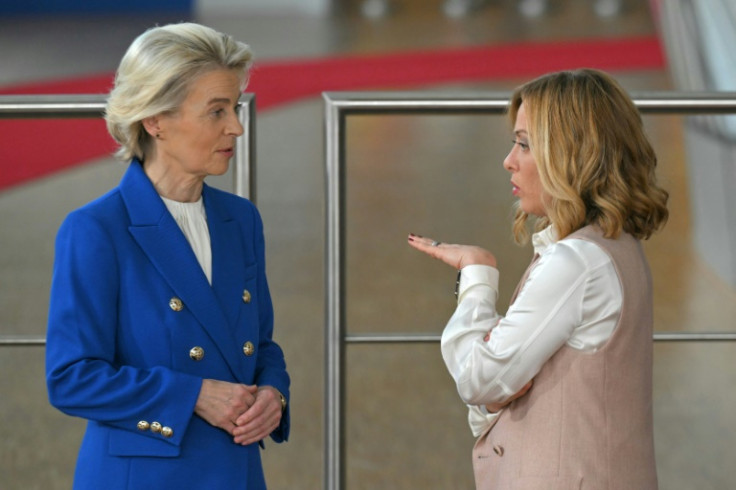
EU leaders will discuss tightening rules on migration as they meet in Brussels on Thursday for a summit that is set to crystallize a rightward shift in the bloc's rhetoric.
Support for Ukraine, with President Volodymyr Zelensky in attendance, and the crisis in the Middle East will be the other main issues on the table at the gathering, which gets underway at 10:00 am (0800 GMT).
"There is a desire to work on pragmatic solutions," Italy's hard-right Prime Minister Giorgia Meloni told reporters on the eve of the migration talks -- though no major decisions were expected on the topic.
Rome, which is hosting a mini-summit just ahead of the main event to discuss a common approach with like-minded countries, started sending some migrants to Albania this week, as part of a deal with Tirana other EU capitals have shown a keen interest in.
Slovenia's Prime Minister Robert Golob on Wednesday described the initiative as a "pilot project" that "all of Europe could learn from".
Italy is among a group of nations pushing for further reform only months after a long-negotiated deal on migration was agreed on.
Irregular border crossings into the European Union are down more than 40 percent this year after reaching the highest level in nearly a decade in 2023, according to the EU border agency, Frontex.
But migration remains "seen as a pressing and an urgent domestic issue" by many of the EU's 27 nations, said a senior EU diplomat.
Hard-right parties often riding anti-immigrant sentiment performed strongly in June European elections and have topped recent national and regional votes in the Netherlands, Austria and Germany.
France also tilted to the right after a snap election this summer.
Some nations want an early implementation of the landmark migration pact struck this year, which hardens border procedures and requires countries to take in asylum seekers from "frontline" states or provide money and resources.
But others feel the package, which will come into force in June 2026, falls short.
A majority of EU countries, including France and Germany, recently signed a proposal to facilitate the deportation of irregular migrants.
The "Franco-German engine is pushing for action", said a senior European diplomat.
EU chief Ursula von der Leyen kickstarted the process earlier this week, promising reforms to "streamline the process of returns".
In a letter to the bloc, she mentioned the controversial idea of developing deportation centres outside the EU.
But a EU diplomat cautioned the idea was "vague and preliminary" and there was no real plan at this stage for it, adding no "major decisions" were expected at the summit.
Disagreement over what remains a subject fraught with legal and ethical issues caused a similar reform effort to fail in 2018 and Spain has already made clear its opposition.
Thursday's summit is expected to start with talks on Ukraine.
Zelensky has been invited to present to EU leaders his "victory plan" to end Russia's invasion, amid fears of dwindling support for Kyiv if former president Donald Trump wins the US presidency next month.
Kyiv is facing mounting pressure to find an exit strategy as it suffers battlefield losses and Moscow intensifies its strikes on infrastructure.
Unveiling the plan for the first time to Ukrainian lawmakers on Wednesday, Zelensky rejected any territorial concessions and urged ramped-up Western backing.
A European diplomatic source said EU states will look to hammer home their support for Kyiv and "penalize the Russian war effort as much as possible".
The bloc recently approved a plan to loan Ukraine up to 35 billion euros ($38 billion) backed by frozen Russian assets -- part of a bigger $50 billion initiative agreed by G7 powers in June.
Calls for de-escalation in Israel's conflicts in Gaza and Lebanon, which are fuelling fears of a broader regional war, are also to feature prominently during the talks.
But the bloc has been divided over its response to the wars and has struggled to exert influence in the region to calm the fighting.
Countries such as Hungary, Austria and the Czech Republic defend Israel's right to defend itself and block the adoption of strong measures against the Israeli authorities.
The summit is taking place in a transition phase in Brussels, where the new European Commission team should take office in early December.








